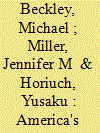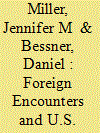|
|
|
Sort Order |
|
|
|
Items / Page
|
|
|
|
|
|
|
| Srl | Item |
| 1 |
ID:
158535


|
|
|
|
|
| Summary/Abstract |
Japan's remarkable postwar growth spurt in the 1960s would not have been possible without Japan's alliance with the United States. Policy makers, political scientists, economists, historians, and journalists on both sides of the Pacific have made this claim, but no study has yet tested it with modern statistical methods. In this article, we compare the economic growth trajectories of Japan and a statistically constructed “synthetic” Japan, which had a similar profile until the late 1950s but did not experience the consolidation of the US–Japan alliance, a process that began in 1958 and culminated with the signing of a formal defense pact in January 1960. We find that Japan's per capita gross domestic product (GDP) grew much faster than the synthetic Japan's from 1958 to 1968. We substantiate these results with in-depth historical analyses on how the United States facilitated Japan's economic miracle.
|
|
|
|
|
|
|
|
|
|
|
|
|
|
|
|
| 2 |
ID:
179052


|
|
|
|
|
| Summary/Abstract |
On December 20, 1940, U.S. President Franklin Delano Roosevelt delivered his sixteenth fireside chat. With Europe reeling from Nazi Germany’s successful conquest of France, the signing of the Tripartite Pact, and the recently concluded Battle of Britain, Roosevelt implored Americans to build “the great arsenal of democracy” that would aid the United Kingdom in its struggle against Germany.
|
|
|
|
|
|
|
|
|
|
|
|
|
|
|
|
| 3 |
ID:
134904


|
|
|
|
|
| Summary/Abstract |
Examining a series of anti-base protests at Tachikawa Air Force base between 1955 and 1957, this article presents a new interpretation of postwar U.S.–Japanese relations. In contrast to previous emphases on a harmonious U.S.–Japanese partnership, it argues that Japanese desires to secure a representative postwar democracy deeply shaped the U.S.–Japanese alliance by fostering constant tensions, negotiations, and compromises between governments and the public. Using a wide range of governmental and nongovernmental American and Japanese sources, it asserts that these protests ultimately encouraged U.S. policymakers to rethink the utility of U.S. bases in mainland Japan and the broader expression of U.S. Cold War power. By exploring the social, political, and diplomatic tensions surrounding U.S. military bases, this article highlights the vital role that weaker allies and foreign publics played in the U.S. global calculations, policy outcomes, and its understanding of its own role in the world.
|
|
|
|
|
|
|
|
|
|
|
|
|
|
|
|
|
|
|
|
|